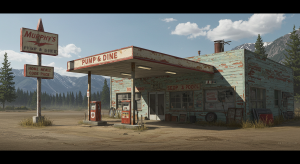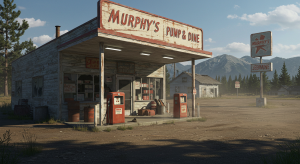
I barely remember my biological mother. I was just a little boy when she disappeared, leaving me with only a photo — a small, worn reminder and my only link to her and the life we might have had. It was creased from years of handling, the edges frayed, the colors faded. But there she was: young, smiling, standing in front of a gas station beneath a quirky old sign that read “Murphy’s Pump & Dine.”
Over the years, I built a new life with my foster family. They were wonderful people — kind, caring, and they loved me deeply. I grew up safe, supported, and I tried to let go of the ache that lingered in my chest. But somewhere in the back of my mind, I always held onto that dream — the dream of finding her. As I grew older, the hope dimmed, buried beneath school, work, responsibilities. It became easier to treat that photo as just a memory, not a clue.
That changed on a trip I hadn’t even wanted to take.
We were driving cross-country — my girlfriend, some friends, and me — heading toward the mountains for a weekend of camping. It was meant to be fun, a distraction. But as the sun began to set and the gas gauge dipped low, we pulled off onto a forgotten highway in search of a place to fill up.
And there it was.
The gas station sat like a relic from the past, nearly swallowed by dust and silence. Peeling paint, broken windows, a flickering overhead light. But it wasn’t those things that stopped me in my tracks.
It was the sign.
Barely legible, it hung lopsided on rusted chains: “Murphy’s Pump & Dine.” My breath caught in my throat. My heart raced. I stumbled out of the car and yanked my backpack from the back seat, pulling out the old photo. My hands shook as I held it up, lining up the image with the place before me.
It was the same.
My mind spun. Could this really be it? Could this be where the photo was taken — where my mother had once stood?
My friends were calling to me, laughing about snacks and bathroom breaks, but their voices were distant. For the first time in years, I felt the pull of something deeper — a thread connecting past and present. I told them I’d catch up. I had to know more.
There was a diner attached to the station, the kind with worn red booths and a long counter lined with cracked stools. A single light glowed inside, and a woman behind the counter looked up as I walked in.
“Kitchen’s closed,” she said, wiping her hands on a towel.
I hesitated, then stepped forward, photo in hand. “I’m not here for food. I’m… I think this place might be connected to my mom.”
She looked at me carefully, then at the photo. Her brow furrowed.

“I haven’t seen that in years,” she whispered. “That was taken here, alright. Early ’90s. That’s Marie in the picture. You’re her boy?”
I nodded slowly, the word catching in my throat. “You knew her?”
The woman — her name was Janet — invited me to sit. She poured me a cup of coffee and told me stories. About a young woman who worked the counter, sweet and bright but always a little sad. About how one day, she left without a word. Just packed a bag and disappeared. Everyone figured she was running from something — or someone.
“She used to talk about her baby,” Janet said softly. “She cried about you. Said they took you. That she didn’t want it that way.”
The dam inside me broke. All these years, I thought maybe she left me by choice. That maybe I wasn’t wanted. But hearing this — hearing that she’d grieved — it undid me.
Janet reached into a drawer and pulled out a small, crumpled envelope. “She asked me to keep this. Said maybe one day, her boy would come looking.”
I opened it with trembling hands. Inside was a letter, yellowed with age. The handwriting was uneven but unmistakably hers. She wrote about her love for me, how she fought to keep me, how scared she was. She left because she was being threatened — by my father’s family. She thought I’d be safer in the system than with them. She never stopped looking.
And at the end, an address — from years ago, but it was something.
The trip changed. I didn’t go camping. I rented a car the next morning and followed the address to a small town two states away. There, in a modest white house with flower pots on the porch, lived an older woman with tired eyes and the same soft smile I remembered from the photo.
She opened the door and froze.
I didn’t have to say a word.
She whispered my name, a name I hadn’t heard since I was a child, and pulled me into her arms. We cried for a long time.
That gas station — that old, dusty sign — gave me back a piece of myself I thought was lost forever. And in that reunion, I found not just my mother, but a sense of belonging that had eluded me my entire life.
Sometimes the past doesn’t stay buried. Sometimes, all it takes is a faded photo and a familiar sign to lead you home.
Thanks for join with us!
Copyright by Iflex9